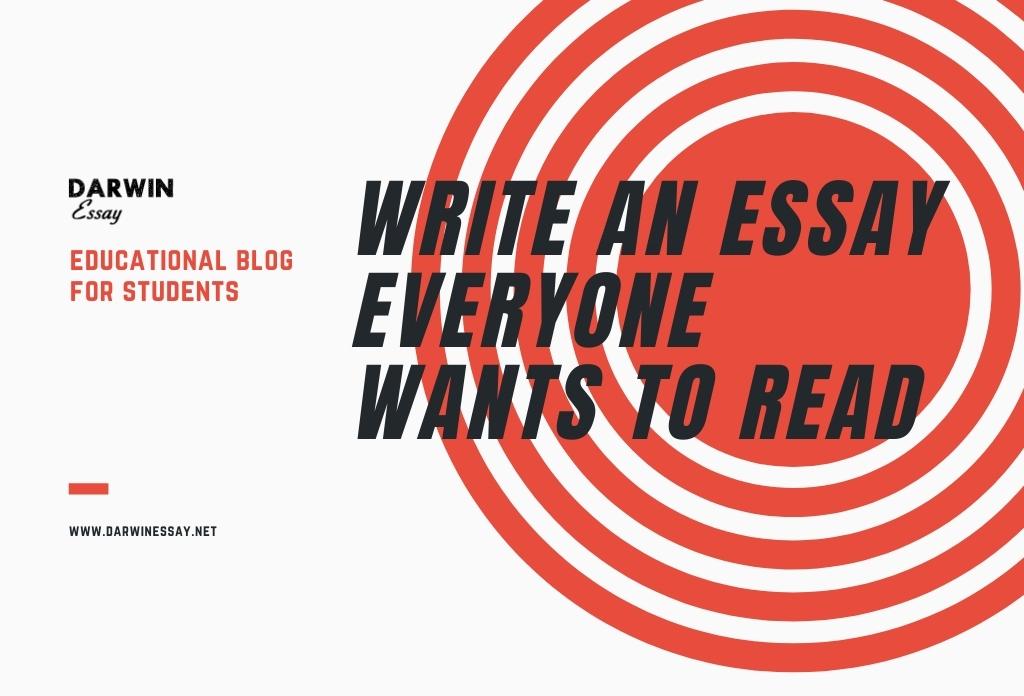How to Write an Essay Everyone Wants to Read
FOR STUDENTS
Writing essays is not an easy job. Many people feel perplexed about where to start and how to make their essays interesting, well-structured, and informative. The problem concerns students who always have to submit academic essays in different subjects as well as those whose job is to produce creative pieces as a part of their regular job.

Here, we want to share some tips on how to make your essays both entertaining and correct. Of course, you do not have to use all of them immediately or follow these things step-by-step because everyone’s creative approaches and understanding of the subject matter may differ considerably from others. However, you can use these elements when you need to create something perfect.
Take Notes of Details
Use your notebook or notecards to write down everything you observe around you, everything that may concern your topic of interest or any ideas that come to your mind. It may not be a paper notebook, however. You can use a note app on your gadget or anything which you can find at hand to take your notes.
Pay attention to any observations, parts of dialogues, random thoughts, and any connections you will use in your future writing.
Another thing is to read a lot, enjoy fine art pieces, listen to music, watch films and videos, and then teach yourself to do some free writing expressing of your thoughts and experiences about what you have just seen or heard. You will learn to pay attention to the world around you, and your essays will become more vivid and persuasive.
Your notes may serve you well when, while writing, you will feel lost or blocked while trying to make your story consistent and smooth.
Tip 1. Practice free writing every time you have to spare 10 minutes. Make a list of things you can observe around you, without any sentences or editing efforts, just a list of details you see.

Learn to Make Questions for the Start
You can make a list of several questions you would like to get answers to. Or they may not be real questions but some ideas you are wondering about. Your essay does not mean sharing ready-made knowledge. Most often, either in your personal or academic writing, you try to put your ideas together to obtain the answers to something that is still not clear for you.
Remember that you are not supposed to write a manual or instruction guide. You will feel more relaxed if you manage to formulate your questions in a straightforward and unedited manner, especially when writing your first draft.
Of course, it may look a bit strange and too messy to you. Though, it is supposed to be like that. Even if you have to write a research paper, you do not know everything that you will find out and write about.
Tip 2. Write down the questions about something related to the topic which you cannot stop thinking about or analyzing. It is free writing as well, so do not try to make it perfect. Just write your questions and considerations – the more, the better.
Telling Stories Is a Useful Skill
Here, you can break the five-paragraph rule you have learned in high school. Also, you are not obliged to use the principle of showing but not telling if you want your essay to be entertaining. Keep a reasonable balance between showing and telling. You will see how attractive your piece of writing will become.
You do not have to tell a complete story, either, because this format does not correspond to essay writing and you will not have too much space for it. Try to make it in changing terms – a question, then a situation at the beginning, and after that, the explanation of everything to your reader. Consider what your reader already knows when they start your essay and what they will learn when they finish reading it.
To maintain your showing-telling balance, combine scenes, episodes, ideas, or thoughts with a summary. You can use some pieces of a dialogue with a further explanation of what they mean. That will help focus your readers’ attention on the main points.
You can start your essay in the same way you would start a kind of short story or screenplay, either with a scene or part of a dialogue. That will create a certain picture in your reader’s mind. Do not try to make the first sentence of the explanation consistent when it is your first draft. It is a waste of time – you are unlikely to use this deliberate sentence in your final version.
Tip 3. Look at the questions you have written from Tip 2. Make out a scene or piece of dialogue related to them. Invent some incident or idea to illustrate the importance of these questions. Try to make them specific for the time and space where they can occur.
Create a Personalized Character
If you write a personal essay, your reader must know something about you. However, when any reader looks at your essay, they will never know who you are, where you are from, and what you mean to tell them. Add some personality to your writing by creating the main character who has experienced certain incidents or ideas and wants to share them with readers. It is not necessarily that it should be true yourself – you may invent things as well.
The only important thing to consider is that you need to sound honest to your readers. It is not about the style only. It is about your ability to reveal your thoughts and ideas in the most understandable and attractive way. If your reader feels that you are honest and trustworthy, they will follow your ideas and considerations up to the end of your essay.
Do not be afraid that you are not interesting to anyone. In fact, you are because you have your unique experience and vision of the world. That means that the story you have made up is worth sharing. That can provide them with some valuable things they will remember and feel impressed with.
Tip 4. Try to complete the sentence ‘I want to tell you something I have never told anyone before…” Think about your unique experience that you have never revealed. It does not mean that you will have to insert that in your essay. You will not have to if you do not feel comfortable about that. It is just an exercise to practice being honest and trustworthy.

Include At Least Two Layers in Your Essay
This is an essential factor to consider even if you are writing an academic essay. It is still more critical for making your personal essays attractive enough. The personal story or vivid true-to-life examples from your character’s experience have to be connected with something larger, which explains why you have chosen that example or episode to illustrate your points of view. This larger part of the story can be revealed interwoven in every section or be seen clearly only at the end of the essay.
This bigger picture is the answer to the questions you have asked at the beginning. When you start writing, you may not even know what these answers will exactly be. This process is similar to writing short stories or even novels. There are always two conflicts in them – a smaller one which is often internal and invisible and a larger conflict, which is always external and obvious. The latter needs to be resolved at the end by some generalizations or conclusions.
In the case of an essay, a large story is more important for your readers than your experiences, examples and incidents (used for illustration and support only) because they can learn many new things from it and receive useful food for thought.
This suggestion as well may not work in the first draft. The development will be possible in your further work or even during the revision of your first draft. You will not be able to detect all the connections if you do not come to the end of your essay and research them consistently. You may look at your essay the next day to make sure that you have placed all the conflicts, ideas and conclusions correctly. Or you may even need to read your essay to someone else or have somebody proofread it to be sure.
Tip 5. Go back to the initial scene you have created for Tip 3. Add something more to it, namely what was going on behind it or what a bigger story and outcome of it can be.
Final Thoughts
Here, you can see that writing an essay that everyone would like to read is not rocket science. You can cope with it successfully if you know where to start and what kind of strategies to apply to your writing process. The only thing to remember is that if you have to write an essay, do not postpone the process of writing it for long. Start with some small idea and then develop it. You will see that our tips will be pretty helpful on your path.


